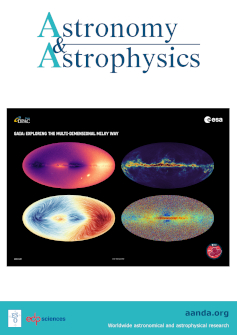Discovery of the preferred direction of electric vector position angle rotations in blazars
IF 5.4
2区 物理与天体物理
Q1 ASTRONOMY & ASTROPHYSICS
引用次数: 0
Abstract
Blazars are a subclass of active galactic nuclei (AGNs) with a high optical linear polarization that originates in relativistic jets. Polarization parameters such as the degree of polarization (PD) and the electric vector position angle (EVPA) are directly related to the properties of the magnetic field in the jets. A study of the optical polarization of blazars allows conclusions to be drawn about the field geometry, its evolution, and its relation to the emission properties of the blazars. The periods of ordered changes in the electric vector position angle, so-called rotations, are of particular interest. We used a new method to determine EVPA rotations and to estimate their statistical significance with the aim to analyze long-term polarimetric observations of five blazars: OJ 287, S5 0716+71, 3C 454.3, CTA 102, and PG 1553+113. This resultes in the identification of 256 EVPA rotations. We found possible tendencies for the EVPA rotations to occur in a preferred direction in each of these sources: clockwise for OJ 287 and CTA 102, and counterclockwise for the others. The EVPA rotations can be explained by the spiral structure of the magnetic field in the jet. In this case, the observed preferred direction of rotations reflects the global structure of the magnetic field, which can be associated with the direction of rotation of either the black hole ergosphere or the accretion disk.发现耀星电矢量位置角旋转的首选方向
亮星是活动星系核(AGN)的一个亚类,它具有高光学线偏振,源于相对论喷流。偏振参数,如偏振度(PD)和电矢量位置角(EVPA),与喷流中磁场的特性直接相关。通过对炽星光学偏振的研究,可以得出有关磁场几何形状、演变及其与炽星发射特性之间关系的结论。电矢量位置角的有序变化周期,即所谓的旋转,尤其引人关注。我们使用了一种新方法来确定电矢量位置角旋转,并估算其统计意义,目的是分析对五颗类星体的长期偏振观测结果:它们是:OJ 287、S5 0716+71、3C 454.3、CTA 102 和 PG 1553+113。由此确定了 256 个 EVPA 旋转。我们发现,在这些来源中,EVPA旋转都可能倾向于发生在一个优先方向上:OJ 287 和 CTA 102 是顺时针方向,而其他来源则是逆时针方向。喷流中磁场的螺旋结构可以解释 EVPA 旋转。在这种情况下,观测到的优先旋转方向反映了磁场的整体结构,这可能与黑洞麦哲伦层或吸积盘的旋转方向有关。
本文章由计算机程序翻译,如有差异,请以英文原文为准。
求助全文
约1分钟内获得全文
求助全文
来源期刊

Astronomy & Astrophysics
地学天文-天文与天体物理
CiteScore
10.20
自引率
27.70%
发文量
2105
审稿时长
1-2 weeks
期刊介绍:
Astronomy & Astrophysics is an international Journal that publishes papers on all aspects of astronomy and astrophysics (theoretical, observational, and instrumental) independently of the techniques used to obtain the results.
 求助内容:
求助内容: 应助结果提醒方式:
应助结果提醒方式:


